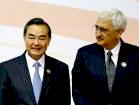 Singapore, Jul 5: India and China will not rush to resolve differences over their contested border even as there has been steady progress in the overall relationship, said External Affairs Minister Salman Khurshid.
Singapore, Jul 5: India and China will not rush to resolve differences over their contested border even as there has been steady progress in the overall relationship, said External Affairs Minister Salman Khurshid.
"I think we have constantly, if not rapidly, made progress. I feel there is no reason why we should continue to feel a sense of alarm or discomfort.
"But it helps to remain cautious and vigilant and careful. Because it is not a relationship that has finally overcome the difficult issues that caused us to actually come into a confrontation," Khurshid said in an interview with The Straits Times published today.
While both sides were determined to resolve these issues, "we are also very clear that it does not help to hasten resolution if you are not ready," Khurshid was quoted as saying.
On South-East Asia, Khurshid said India was not looking for a military base in the region but would focus on deepening strategic ties, even as its Look East policy extends to the Pacific.
"We are not a country that subscribes to policing any part of the world. The areas we are comfortable with are capacity building, intelligence sharing, exchange of ships, call on each other's ports, joint training and exercises. We are willing to enhance that at the pace at which ASEAN collectively desires it to be done," he told the daily.
Khurshid also expressed his views on India's three aircraft-carrier strategy, saying as a Peninsula, the country needed one carrier on each side, and one as a reserve.
India needed so many carriers because of the long coastline on its eastern and western flanks, he said.
"If you have one carrier on each side and one in reserve, it is not much. We could do with many more carriers, but obviously there are limits to what we can spend and the need that we have at present will be well-served by three carriers," he said.
Khurshid suggested India's Look East policy should be extended beyond ASEAN and East-Asian powers of China, Japan and South Korea. "We are actually looking at the Indo Pacific now. Once we are in APEC (Asia-Pacific Economic Cooperation Forum), it gives us further opportunity," he said.
Khurshid said the ruling UPA government wanted to fulfil its promises made in its last manifesto before going to polls, and cited initiatives like food security bill, land reforms bill and the Aadhar scheme.
"To go to the people and say that we didn't have enough time at the end of five years is not a good idea," he said, adding that there was still work left to be completed before the party goes to the people.







Comments
Add new comment